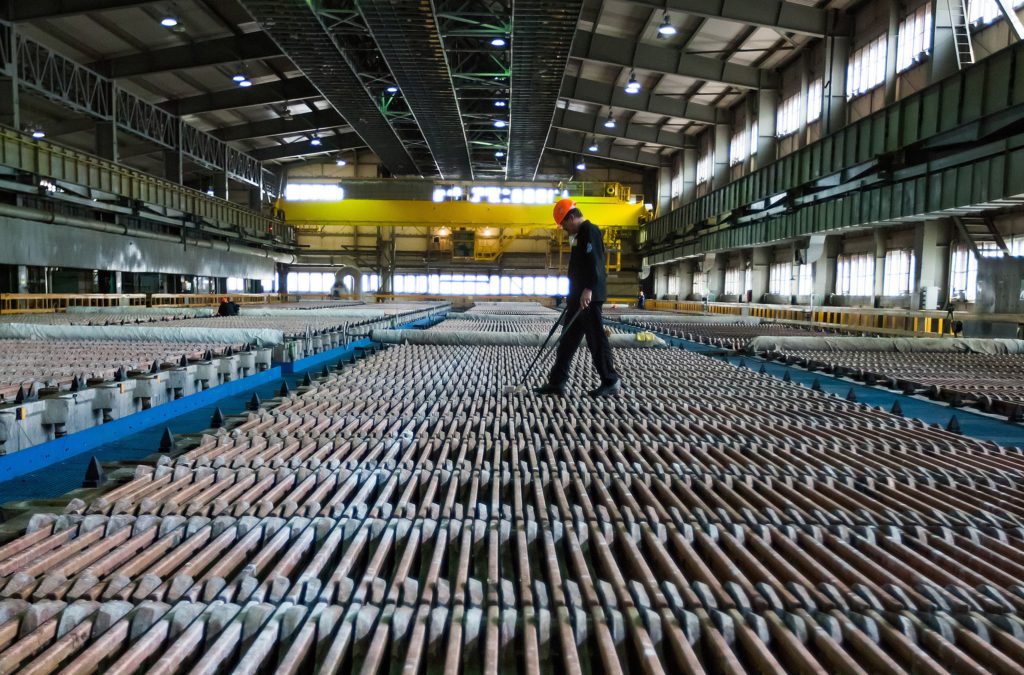Column: China may solve the LME’s Russian copper problem. But at a price

(The opinions expressed here are those of the author, Clyde Russell, a columnist for Reuters)
China will be a key component of how ever the London Metal Exchange (LME) decides to attempt to solve its Russia conundrum, with the possibility that the world’s largest importer of metals becomes the effective market of last resort.
The venerable LME is facing a situation that almost certainly is a no-win for virtually all its stakeholder – trying to work out what to do with Russian shipments of copper, nickel and other metals.
While the choice largely comes down to allowing Russian metals to continue to trade freely within the LME system, or effectively banning them, both pathways are likely to have consequences that not all players will be willing to accept.
It’s here that China could play a role, especially in copper and nickel, and perhaps even in aluminum.
The theory is that China will be happy to take Russian metal that can no longer enter the LME system, either because of government actions or by companies self-sanctioning as they no longer want to do business with Russia after Moscow’s Feb. 24 invasion of Ukraine.
It won’t be out of the goodness of its heart that China takes Russian metal, rather it will because cargoes can be secured at a discount to LME benchmark prices.
There is already something of a template for how China could become the market of last resort for Russian metal, with this year’s experience with crude oil and coal providing some pointers.
Western sanctions, both formal and voluntary, on Russian exports of crude oil, refined fuels and coal, have been quicker out of the block than the proposed actions against metal shipments.
Trade flows have been adjusting, with Western buyers shunning Russian crude and products, and a formal European Union ban on crude coming into effect in December and on products in February.
Russia has overtaken Saudi Arabia as China’s top supplier of crude oil, and China has also boosted imports of Russian coal.
It’s not just a China story for the energy commodities, with India also boosting its imports of Russian crude and coal, with both Asian giants taking advantage of the discounts on offer.
It’s possible that any ban on Russian metal in Europe or in the LME system will result in a realignment of global flows of the metal, with China buying what others are no longer willing or able to take from Russia.
However, the energy experience shows there are substantial costs involved in this sort of realignment.
Thermal coal prices surged to record highs in the months after the invasion of Ukraine, and while they have retreated in recent weeks, they are still double the level of this time last year for most seaborne grades of the polluting fuel.
Crude oil prices also remain elevated, but more importantly for the health of the world economy, prices for diesel are still close to record highs on a retail basis in many countries given the loss of Russian supplies of the transport fuel, as well as lower exports from China.
Unhappy precedent?
The struggle to re-route trade flows for energy is likely to be mirrored with metals if Western nations do shun Russian supplies, especially given the high prevalence of Russian copper in LME warehouses, with the proportion reaching levels near 80% at certain points this year.
If Russian copper is effectively removed from the LME, it means the exchange’s users will have to scramble to find alternative sources, especially in Europe, which would have to work out ways of buying from other big exporters such as Chile and Australia.
In turn, buyers in China would have to be incentivized to buy Russian metal and forgo supplies from countries and companies with which they may have had long-standing relationships.
There is less Russian nickel in the LME system, perhaps about 5% of the total, but Russian aluminum makes up closer to a quarter of the total.
China is a net exporter of aluminum, meaning there would have to be a significant price incentive to effectively “churn” metal through China.
Under this scenario, China would import Russian aluminum and export a greater share of its domestically produced metal, something that’s possible, but only if there was a profit motive for Chinese traders and producers.
Overall, whatever emerges from the LME’s discussion paper on Russian metal, the likelihood is that 2023 will see some form of disruption to the established ways of doing business.
The crude oil and coal precedent isn’t exactly comforting, and once again much will depend on how China reacts to whatever Western governments and metals market participants try to do.
(Editing by Mark Potter)
{{ commodity.name }}
{{ post.title }}
{{ post.date }}




Comments